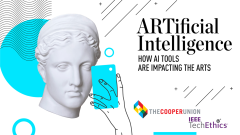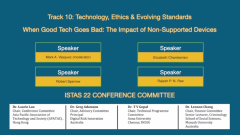Self-Driving Cars and Beyond: Societal Impacts of Autonomous Transportation Systems - IEEE TechEthics Panel
About the Talk: While cars dominate the current autonomous transportation conversation, other means have become increasingly reliant on non-human interaction. This panel explores the social implications of the broader autonomous vehicles landscape.
About the Speakers:
Philip E. Ross (moderator) became a senior editor at IEEE Spectrum in June 2006. His interests include transportation, energy storage, artificial intelligence, natural-language processing, and the economic aspects of technology. He has reported on solar towers in Spain, cloud seeding in Nevada, telescopes atop a mountain in the Canaries, and robotic cars in California and Germany. He blogs mainly for Cars That Think, which won a 2015 Neal Award. Earlier in his career he worked for Red Herring, Forbes, Scientific American, and The New York Times. He has a master's degree in international affairs from Columbia University and another, in journalism, from the University of Michigan.
Jason Borenstein, Ph.D., is the Director of Graduate Research Ethics Programs and Associate Director of the Center for Ethics and Technology at the Georgia Institute of Technology. His appointment is divided between the School of Public Policy and the Office of Graduate Studies. He is an assistant editor of the journal Science and Engineering Ethics, co-editor of the Stanford Encyclopedia of Philosophy's Ethics and Information Technology section, and an editorial board member of the journal Accountability in Research. He is also Editor for Research Ethics for the National Academy of Engineering's Online Ethics Center for Engineering and Science.
Mary (Missy) Cummings is the director of the Humans and Autonomy Laboratory at Duke University. She received her B.S. in Mathematics from the US Naval Academy in 1988, her M.S. in Space Systems Engineering from the Naval Postgraduate School in 1994, and her Ph.D. in Systems Engineering from the University of Virginia in 2004. A naval officer and military pilot from 1988-1999, she was one of the U.S. Navy's first female fighter pilots. She is currently a Professor in the Duke University Pratt School of Engineering, the Duke Institute of Brain Sciences, and the Duke Computer Science Department. She is a fellow for the American Institute of Aeronautics and Astronautics and is the co-chair for the World Economic Forum's Council on Artificial Intelligence and Robotics. Her research interests include human supervisory control, human-unmanned vehicle interaction, human-autonomous system collaboration, human-robot interaction, human-systems engineering, and the ethical and social impact of technology.
Recorded at the IEEE TechEthics Conference, held on 13 October 2017 at the National Academy of Sciences Building in Washington, DC. The conference was made possible in part by a grant from the IEEE Foundation. Special thanks to the National Academy of Engineering.
About the Talk: While cars dominate the current autonomous transportation conversation, other means have become increasingly reliant on non-human interaction. This panel explores the social implications of the broader autonomous vehicles landscape.
 Cart
Cart Create Account
Create Account Sign In
Sign In





